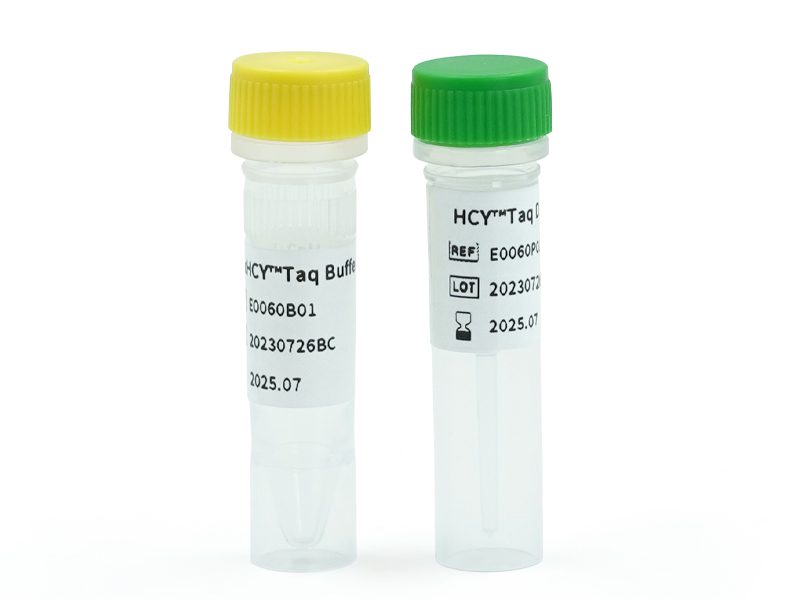What is PCR Taq Enzyme?
6477Taq enzyme, officially known as Taq DNA polymerase, is a critical tool in molecular biology and genetic research.
View detailsSearch the whole station Pandemic Supply
Taq enzymes, particularly Taq DNA polymerase, have found widespread application in molecular biology and genetic research due to their unique properties

Perhaps the most well-known and fundamental application of Taq DNA polymerase is in PCR. Taq polymerase is used to amplify specific DNA sequences rapidly and efficiently. In a typical PCR reaction, DNA is denatured at a high temperature, and then primers anneal to the target sequence. Taq polymerase extends these primers, synthesizing new DNA strands. The heat resistance of Taq polymerase allows for repeated cycles of denaturation, annealing, and extension, resulting in the exponential amplification of the DNA of interest. This technique is invaluable in DNA cloning, genotyping, sequencing, and diagnostics.
Taq DNA polymerase is also employed in DNA sequencing methods, including Sanger sequencing and next-generation sequencing (NGS). In Sanger sequencing, it is used to replicate DNA strands with dideoxynucleotides (ddNTPs), which terminate DNA synthesis at specific positions, allowing the determination of the DNA sequence. In NGS, modified versions of Taq polymerase may be used for library preparation and amplification before sequencing.
Taq polymerase is frequently used in gene cloning procedures. After PCR amplification of a target gene, the resulting DNA fragment can be ligated into a cloning vector. Taq polymerase is instrumental in generating the high-quality DNA fragments needed for successful cloning.
Taq polymerase is employed in techniques like allele-specific PCR and mismatch PCR to detect specific mutations or single nucleotide polymorphisms (SNPs) associated with diseases or genetic variations.
TaqMan assays, which utilize Taq polymerase, are widely used for genotyping studies. These assays combine PCR with specific fluorescently labeled probes to identify and quantify the presence of specific alleles in a sample.
Taq polymerase has applications in microbial detection and identification. Techniques like 16S rRNA gene amplification and sequencing use Taq polymerase to identify and classify bacteria and archaea.
Taq polymerase is used in environmental studies to detect and quantify microbial populations in various ecosystems. In forensics, it is employed in DNA profiling for identifying suspects and victims.
TaqMan-based real-time PCR assays are widely used for clinical diagnostics. They allow for the detection of pathogens, genetic disorders, and various diseases with high sensitivity and specificity.
Beyond the specific applications mentioned above, Taq enzymes are essential tools in various molecular biology experiments. They are used for DNA synthesis, amplification, and manipulation in countless research projects, enabling scientists to study genes, proteins, and other biological molecules.
In summary, Taq enzymes, particularly Taq DNA polymerase, have revolutionized molecular biology and genetics by enabling techniques like PCR, DNA sequencing, gene cloning, and mutation detection. Their robustness, heat resistance, and versatility make them essential components of many laboratory protocols and diagnostic assays, facilitating advancements in both basic research and clinical applications.
“HCY, Health care for you” is our forever mission. We dedicate to offering safe & reliable products and medical services with our global creditable partners. HCY has already supplied to WHO, MAYO clinic, MGI, DDC, Yale University, Qorvo, Quanterix, Thomas Scientific, SD biosensor, Cardinal Health, Cleveland Clinic, Mars Petcare & LumiraDx, etc. in the past years.
Taq enzyme, officially known as Taq DNA polymerase, is a critical tool in molecular biology and genetic research.
View detailsPCR (polymerase chain reaction) is a technique commonly used to amplify DNA molecules in vitro, and PCR enzymes are a key component of this reaction.
View detailsWe value your privacy We use cookies to enhance your browsing experience, serve personalized ads or content, and analyze our traffic. By clicking "Accept All", you consent to our use of cookies.
Our Privacy Policy